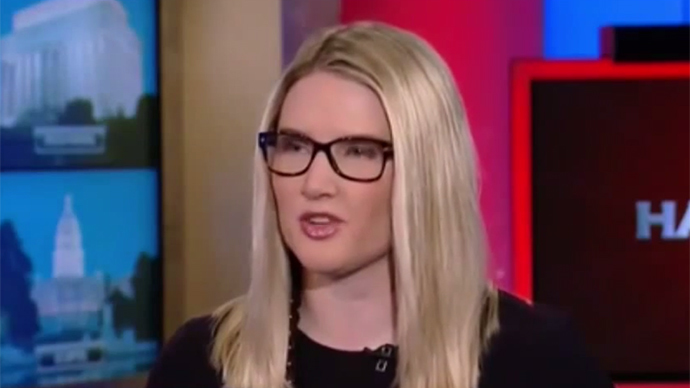The United States and its allies cannot defeat the Islamic State simply by killing militants, said State Department spokeswoman Marie Harf, adding that it must target the underlying reasons people join the group, such as the lack of job opportunities.
Harf made the comments during an interview with Chris Matthews on MSNBC’s ‘Hardball.’ She said that while the American-led coalition against the Islamic State (IS, also known as ISIS/ISIL) will continue battering militant strongholds in the Middle East, force will not be enough on its own.
READ MORE:45 people ‘burned to death’ by ISIS jihadists in Iraq
“We’re killing a lot of them, and we’re going to keep killing more of them. So are the Egyptians, so are the Jordanians – they’re in this fight with us,” Harf said. “But we cannot win this war by killing them. We cannot kill our way out of this war. We need in the medium to longer term to go after the root causes that leads people to join these groups, whether it’s a lack of opportunity for jobs, whether…”

Matthews interrupted Harf at this point, arguing that world nations will never be able to put an end to poverty in our lifetimes, implying that such a strategy would never work.
The statement, made by deputy spokeswoman Marie Harf on Chris Matthews’ Hardball on MSNBC, came after ISIS allegedly released a video showing the beheading of 21 Egyptian Coptic Christians. Matthews suggested to Harf that the purpose of the act was to humiliate the West.
READ MORE:Egypt eyes revenge after ISIS executes 21 Copts, releases video
In return, Harf suggested a soft power-like approach: “We can work with countries around the world to help improve their governance. We can help them build their economies so they can have job opportunities for these people.”
She conceded, however, that there is “no easy solution.”
Marie Harf on ISIS: "We can help them build their economies so they can have job opportunities for these people." pic.twitter.com/6hUzPmJ0C3
— David Burge (@iowahawkblog) February 17, 2015
Earlier in the interview, Mathews asked what the next steps were following the news that 21 Egyptian Christians were recently beheaded and that ISIS was gaining momentum in Libya, a country that lies perilously close to Italy and, thus, Europe.
“I think this just underscores this isn’t just a fight in Iraq and Syria and that isn’t just a fight about dropping bombs on terrorists. It is about how we stop the causes that lead to extremism,” Harf said. “In a place like Libya, the fact there’s no governance and no opportunities for young people it lets groups like ISIL grow there, flourish there, which is what you saw with this awful situation with these Egyptians.”
READ MORE: White House wants to expand online anti-ISIS campaign
Harf also mentioned that the White House is hosting a summit dedicated to countering violent extremism – one that will highlight domestic and international efforts to prevent militants and their supporter from committing acts of violence.
Obama administration officials also revealed on Tuesday their own social media campaign as a counter measure to the slick production values and social media savvy of ISIS through a State Department entity created in 2009 – the Center for Strategic Counterterrorism Communications. The White House plans to announce expansion of the center “to harness all the existing attempts at counter messaging by much larger federal departments, including the Pentagon, Homeland Security and intelligence agencies.” Additionally, it will establish connections to help the team coordinate with foreign allies, NGOs and Islamic leaders opposed to ISIS.

